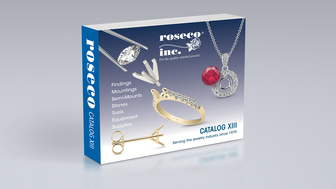Chris Blakeslee has experience at Athleta and Alo Yoga. Kendra Scott will remain on board as executive chair and chief visionary officer.
Supreme Court Divided on Issue of Online Sales Tax
Some justices say the current structure for collecting sales tax for items bought online needs to be updated while others argue it’s an issue for the legislative branch.

Washington--The U.S. Supreme Court heard arguments Tuesday morning in the case that could, or could not, change Quill, the decades-old decision governing collection of sales tax online.
The case, South Dakota vs. Wayfair Inc. et al, pits proponents of online sales tax collection, including states and retail organizations like Jewelers of America and the National Retail Federation, against online sellers like Jewelry Television, Etsy and eBay.
At issue is Quill vs. North Dakota, the 1992 Supreme Court ruling that prevents states from collecting sales tax from sellers with no physical presence, meaning a store, a warehouse, etc., in the state.
Heading into oral arguments, two justices who often find themselves on opposite sides of an issue—Justices Anthony Kennedy and Neil Gorsuch—had publicly expressed support for overturning Quill, a decision that Gorsuch described Tuesday as “antiquated.”
Justice Ruth Bader Ginsburg indicated during oral arguments that she agreed with Kennedy and Gorsuch, stating that those opposed to overturning Quill make the case that asking an out-of-state seller to collect tax on goods shipped in-state discriminates against interstate commerce.
“But as I see it,” she said, “why isn’t it, far from discriminating, equalizing sellers; that is, anyone who wants to sell in-state, whether an in-state shop, an out-of-state shop, everybody is treated to the same tax collection obligation. All who exploit an in-state market are subject to the in-state tax. Why isn’t that equalizing rather than discriminating?”
However, Justices Sonya Sotomayor, Samuel Alito and Elena Kagan seemed to agree that while Quill is outdated, the issues of governing sales tax collection is best left to Congress due to the complexities involved.
“From this court’s perspective, the choice is just binary. It’s you either have the Quill rule or you don’t,” Kagan said. “But Congress is capable of crafting compromises and trying to figure out how to balance the wide range of interests involved here.
“Now, the general (South Dakota Attorney General Marty Jackley, who spoke on behalf of the state in front of the court) said Congress hasn’t done that, but … Congress can decide when it wants to craft a compromise and when it doesn’t want to craft a compromise. And then Congress, if it decides it wants to craft a compromise, can craft a compromise in ways that we cannot.”
Justice Stephen Breyer mentioned that placing the administrative burdens of having to collect sales tax in every state could hinder smaller online sellers from entering the
And Chief Justice Roberts indicated that the time to overturn Quill has come and gone.
“In terms of economic impact, I mean, the suggestion in some of the briefs is that this is a problem that has peaked in the sense that the bigger e-commerce companies find themselves with physical presence in all 50 states. So they’re already covered.”
This includes the biggest online retailer in the country, Amazon, which announced last March that it would begin collecting sales tax in all 50 states.
“And,” Roberts continued, “the workarounds that some of the states have employed are also bringing more in. If it is, in fact, a problem that is diminishing rather than expanding, why doesn’t that suggest that there are greater significance to the arguments that we should leave Quill in place?”
The issue of online sales tax collection ended up before the Supreme Court because of a law South Dakota passed in March 2016 requiring companies that make more than $100,000 in sales or have more than 200 transactions per calendar year remit sales tax whether or not they have a physical presence in South Dakota.
Three online retailers, Overstock.com Inc., Wayfair Inc. and NewEgg Inc., filed a lawsuit against the state and ultimately won, with the South Dakota Supreme Court ruling that the U.S. Supreme Court’s 1992 Quill decision, however dated, remains the controlling precedent on the issue of interstate tax collection.
South Dakota petitioned the Supreme Court to reconsider Quill in October 2017. In January, the court agreed to do so.
A complete transcript of Tuesday’s oral arguments in South Dakota vs. Wayfair Inc. et al is available on the Supreme Court’s website.
A decision in the case is expected before the court’s current term ends in late June.
The Latest

The credit card companies’ surveys examined where consumers shopped, what they bought, and what they valued this holiday season.

Kimberly Miller has been promoted to the role.

How Jewelers of America’s 20 Under 40 are leading to ensure a brighter future for the jewelry industry.

The “Serenity” charm set with 13 opals is a modern amulet offering protection, guidance, and intention, the brand said.


“Bridgerton” actresses Hannah Dodd and Claudia Jessie star in the brand’s “Rules to Love By” campaign.

Founded by jeweler and sculptor Ana Khouri, the brand is “expanding the boundaries of what high jewelry can be.”

Roseco’s 704-page catalog showcases new lab-grown diamonds, findings, tools & more—available in print or interactive digital editions.

The jewelry manufacturer and supplier is going with a fiery shade it says symbolizes power and transformation.

The singer-songwriter will make her debut as the French luxury brand’s new ambassador in a campaign for its “Coco Crush” jewelry line.

The nonprofit’s new president and CEO, Annie Doresca, also began her role this month.

As the shopping mall model evolves and online retail grows, Smith shares his predictions for the future of physical stores.

The trade show is slated for Jan. 31-Feb. 2 at The Lighthouse in New York City's Chelsea neighborhood.

January’s birthstone comes in a rainbow of colors, from the traditional red to orange, purple, and green.

The annual report highlights how it supported communities in areas where natural diamonds are mined, crafted, and sold.

Footage of a fight breaking out in the NYC Diamond District was viewed millions of times on Instagram and Facebook.

The supplier has a curated list of must-have tools for jewelers doing in-house custom work this year.

The Signet Jewelers-owned store, which turned 100 last year, calls its new concept stores “The Edit.”

Linda Coutu is rejoining the precious metals provider as its director of sales.

The governing board welcomed two new members, Claire Scragg and Susan Eisen.

Sparkle with festive diamond jewelry as we celebrate the beginning of 2026.

The master jeweler, Olympian, former senator, and Korean War veteran founded the brand Nighthorse Jewelry.

In its annual report, Pinterest noted an increase in searches for brooches, heirloom jewelry, and ‘80s luxury.

Executive Chairman Richard Baker will take over the role as rumors swirl that a bankruptcy filing is imminent for the troubled retailer.

Mohr had just retired in June after more than two decades as Couture’s retailer liaison.

Shekhar Shah of Real Gems Inc. will serve as president of the Indian Diamond & Colorstone Association in 2026.

This year’s good luck charm features the mythical horse Pegasus, and is our first Piece of the Week of the new year.



























